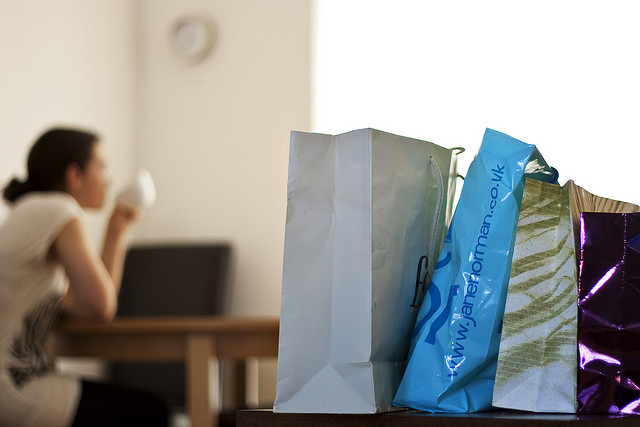There’s no denying it. It’s purchasing season.
It may be overwhelming to realize that every dollar we spend casts a vote for how we want the world to be, but it’s empowering too.
When we do this with large sums of money it’s more obvious, and its called investing. We don’t often think of it that way when we spend $3 on a hamburger or $6 on shampoo. But when we put our dollars toward the $3 hamburger or $6 shampoo, we’re essentially saying, yes, this $3 hamburger is the way I want things to be.
It’s the everyday things we buy, because we’re in effect saying, I’ll buy this thing every day.
These things, the trappings of our lives, are pervasive. And the raw materials from which they are made are even more ubiquitous. This is why the components of our food chain matter. Most foodies will say this. But what about the components of our stuff? Our deodorants, our packaging, our furniture and textiles, our “disposables” (which actually aren’t that disposable, and take centuries to break down).
We all know the problems. The algorithm Facebook has for me shows mostly articles about Big Ag, Big Drug, Big Data, Big Fossil Fuel, and presumably Big Greed, whoever They are, running my life and the world; drilling, shipping, dumping, churning out trash or stuff that will become trash.
Where do you think these corporations got all their money? We bought their stuff! We said, yes, here is something that I’ll buy every day, so you should make it available, every day.
In doing so, we have made our world.
It’s not enough to present cultural and environmental problems, we have to look for helpful solutions, too. Everyone does. My goal is not to make you feel hopeless in the face of huge problems, but to point out small ways to take action. Ways to be the change.
Big will say there is no other way, and maybe there isn’t. There are a lot of people in the world, and they all want stuff, and food, and energy. Maybe Big is the way to go. But Big could certainly be Better. In fact, if Big is going to work, it has to be.
For some people, there is only one practical choice. For some, the only available food and stuff is cheap, because the price doesn’t include the actual cost of human labor or raw material. It doesn’t include the loss of clean water or an actual living wage.
This lack of choice seems a little too close to fascism, or tyranny, or slavery, or whatever Big you fight. If you have the money to opt out, you should, because there are others who have no choice.
Buy local food.
Go solar energy.
Vote hemp for stuff.
Life doesn’t have to change that much. We can still work on the things we’re interested in. We can still have food and energy and stuff. We can still have fancy things, and rare things and big things.
Hemp is a great plant, and just like you can know who grows your food by talking to those people, you can also know who makes your other regularly consumed products, and endorse those methods.
This is how you make tiny investments in how you want the world to be.
Cannabis legalization in a few states is reopening doors to growing hemp as an American cash crop. Now, for those who don’t know, the whole cannabis plant offers way more than buds for medicine. It offers fibers, oils and animal feed—the underpinnings of so many things we don’t even realize we use.
The other thing is that since humans have been manipulating this plant for so long, we are way ahead in the game of breeding seeds for traits we like—taller, more fibrous, no THC.
What would the world look like if we could merge culture, science and humanity such that humans can live fulfilled, while still sustaining that which sustains us. Yes, life will look different, but the future is going to be different no matter what we do.
Things are progressing quickly, and we must adapt quickly.
Putting dollars toward hemp just provides another option. We have science and we’re building all the time. Science and industry have the same roots, there’s no reason they can’t be used to solve the world’s problems in an interdisciplinary way. Hemp is a beautiful hybrid for an industrial culture. It’s seemingly sustainable, which means we’ll have plenty of time to improve on it.
We need built in ways to curb unforeseen consequences of going Big.
It’s true, all the “Bigs” now are so big that removing or replacing them would be difficult and probably cause social unrest. However, gradual shift to less Big industries that take sustainability, biodiversity and human rights into account seems to be the only peaceful means of cultural shift.
We don’t have to decide all at once what the future should look like. We can make tiny little votes. Start with every day things. Get rid of that what-can-I-do-about-it feeling, and put daily money into good things you believe in. Ride the wave of consumer frenzy to bolster companies that you want to thrive.
Hemp Blog
Solar Freakin Roadways
Local Harvest
Loose change. The evolution in your pocket.
Love elephant and want to go steady?
Sign up for our (curated) daily and weekly newsletters!
Author: Molly Bidlack
Editor: Catherine Monkman
Photo: Rob/Flickr







Read 0 comments and reply